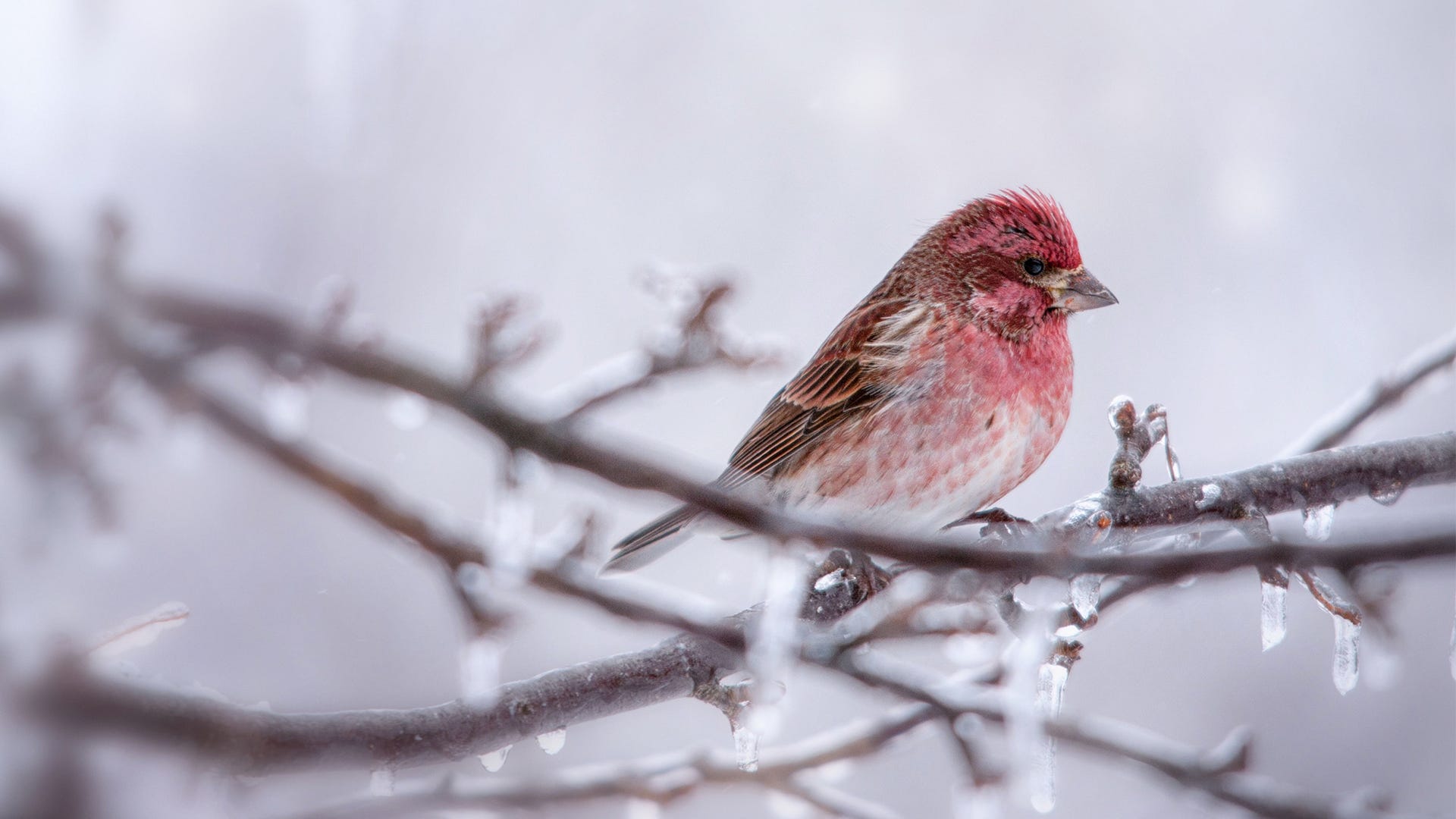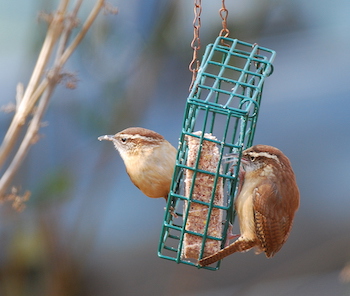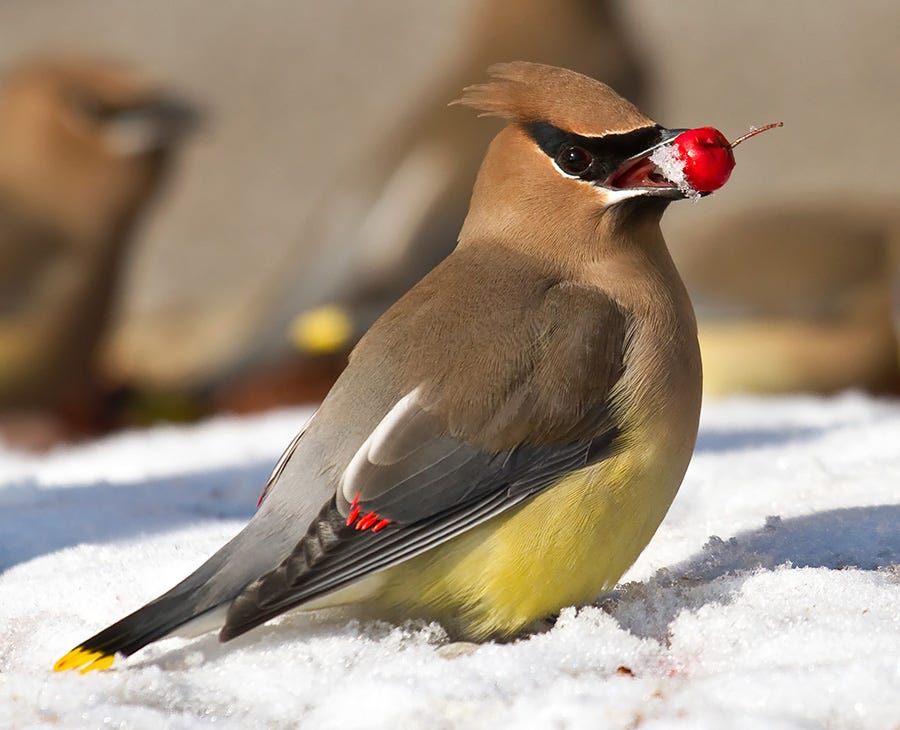Feeding winter birds in South Carolina is not only a popular activity, but it is also an enjoyable one for both bird enthusiasts and nature lovers alike. With mild winter weather, characterized by temperatures ranging from 40-60 degrees Fahrenheit, South Carolina becomes a temporary home for many migrating birds. While the primary purpose of bird feeding in the region is for human enjoyment, it also provides much-needed sustenance for the avian visitors. Among the common winter birds in South Carolina are the Tufted Titmouse, Northern Cardinal, Carolina Chickadee, Carolina Wren, Yellow-rumped Warbler, Red-bellied Woodpecker, White-throated Sparrow, Downy Woodpecker, American Goldfinch, House Finch, Song Sparrow, Mourning Dove, and Blue Jay. To attract these delightful creatures, hopper feeders with black oil sunflower seeds are recommended, along with suet feeders for species such as the Carolina Chickadee and woodpeckers.

Choosing the Right Feeders
When it comes to attracting and feeding winter birds in South Carolina, it’s important to choose the right feeders. Two popular options for winter bird feeders are hopper feeders with black oil sunflower seeds and suet feeders.
Hopper Feeders with Black Oil Sunflower Seeds
Hopper feeders are a great choice for attracting a wide variety of winter birds. They are designed to hold a large amount of birdseed and protect it from the elements. By using black oil sunflower seeds in the hopper feeder, you can attract many different species of birds.
Black oil sunflower seeds are a preferred food for winter birds in South Carolina. They have a high oil content and provide a good source of energy for birds during the colder months. The small size of the seeds also makes them easy for birds to consume.
To attract winter birds with hopper feeders, it’s important to place the feeder in a quiet and sheltered location. This will provide birds with a safe and comfortable place to feed. Additionally, it’s important to regularly clean and maintain the feeder to ensure the birdseed remains fresh and dry.
Suet Feeders
Suet feeders are another excellent option for attracting winter birds, especially woodpeckers and Carolina Chickadees. Suet is a high-fat food that provides birds with extra energy and warmth during the winter months.
When choosing suet for your feeder, it’s best to opt for flavors that are attractive to the birds you want to attract. Popular suet flavors include peanut, berry, and insect blends. By offering a variety of flavors, you can cater to the preferences of different bird species.
Like hopper feeders, suet feeders should be placed in a quiet and sheltered location. This will ensure that birds feel safe and comfortable while feeding. It’s also important to regularly clean and maintain suet feeders to prevent mold or disease from forming.
Attracting Winter Birds
South Carolina is a popular destination for many birds during the winter months. The mild winter weather, with temperatures ranging from 40-60 degrees F, makes it an attractive location for birds seeking refuge from colder climates.
Some of the common winter birds you can expect to see in South Carolina include the Tufted Titmouse, Northern Cardinal, Carolina Chickadee, Carolina Wren, Yellow-rumped Warbler, Red-bellied Woodpecker, White-throated Sparrow, Downy Woodpecker, American Goldfinch, House Finch, Song Sparrow, Mourning Dove, and Blue Jay.
To attract these birds to your yard, it’s important to provide them with the preferred food they enjoy. Offering black oil sunflower seeds and other preferred birdseed blends will greatly increase your chances of attracting a diverse range of bird species.
Benefits of Feeding Winter Birds
Feeding winter birds in South Carolina not only brings joy to humans but also provides important benefits for the birds themselves and the environment as a whole.
Enhancing Biodiversity
By attracting a variety of winter birds to your yard, you are enhancing the biodiversity of your local ecosystem. Birds play a crucial role in pollination and seed dispersal, which helps to maintain a healthy and balanced environment.
Enjoyment for Humans
Feeding winter birds can be a source of great pleasure and enjoyment for humans. Observing these beautiful creatures up close and personal can provide a sense of calm and happiness. It’s a wonderful way to connect with nature, especially during the colder winter months.
Supporting Bird Populations
By providing food and shelter for winter birds, you are supporting their populations and contributing to their overall well-being. Especially in urban areas where natural habitats are limited, bird feeders can serve as a lifeline for many bird species.
Hopper Feeders for Winter Birds
Hopper feeders are highly recommended for attracting winter birds in South Carolina due to their large capacity and ability to protect birdseed from the elements.
Why Hopper Feeders are Recommended
Hopper feeders are designed with a seed reservoir and a mechanism that allows birds to access the seed as they need it. This reduces the frequency of refilling and ensures that the seed remains dry and fresh for longer periods of time.
Black Oil Sunflower Seeds as a Preferred Food
Black oil sunflower seeds are considered a preferred food for many winter birds in South Carolina. These seeds have a high oil content, making them a great source of energy for birds during the colder months. Additionally, the small size of the seeds makes them easily consumable for birds of all sizes.
Placement and Maintenance of Hopper Feeders
To attract winter birds with hopper feeders, it’s important to place them in a quiet and sheltered location. This will provide birds with a sense of safety and security while they feed. Regular cleaning and maintenance of hopper feeders are also essential to keep the birdseed fresh and prevent mold or disease from forming.

The Best Seed for Winter Birds
When it comes to choosing the best seed for winter birds in South Carolina, black oil sunflower seeds are a top choice. However, there are other preferred seeds and blends that can also attract a variety of bird species.
Black Oil Sunflower Seeds
Black oil sunflower seeds have a high oil content and are easy for birds to open and consume. They are a favorite among many winter bird species, including the Tufted Titmouse, Northern Cardinal, and Downy Woodpecker.
Other Preferred Seeds and Blends
In addition to black oil sunflower seeds, there are other seed options that can attract winter birds. These include nyjer seeds, safflower seeds, and millet. Many specialty birdseed blends are available that contain a combination of these seeds, catering to the preferences of different bird species.
Avoiding Cheap Filler Seeds
When purchasing birdseed for winter birds, it’s important to avoid blends that contain cheap filler seeds such as milo or red millet. These seeds are often left uneaten by birds and can create a mess around the feeder. Opting for high-quality seed blends will attract more birds and reduce waste.
Attracting Woodpeckers and Chickadees
Suet feeders are an excellent choice for attracting woodpeckers and Carolina Chickadees to your yard during the winter months.
The Benefits of Suet Feeders
Suet feeders provide a high-fat food source that gives birds extra energy and warmth during the cold winter months. Woodpeckers and Carolina Chickadees are particularly fond of suet and will readily visit feeders that offer this delicious treat.
Preferred Suet Flavors
When choosing suet for your feeder, consider offering flavors that woodpeckers and Carolina Chickadees find appealing. Peanut, berry, and insect blends are all popular choices that will attract these birds.
Placement and Maintenance of Suet Feeders
To attract woodpeckers and Carolina Chickadees with suet feeders, it’s important to place them in a quiet and sheltered location. This will provide birds with a sense of safety and encourage them to visit regularly. Regular cleaning and maintenance of suet feeders are also essential to prevent the growth of mold or disease.

Creating a Bird-Friendly Environment
In addition to providing food, there are other steps you can take to create a bird-friendly environment in your yard.
Providing Fresh Water
Water is essential for birds, even in the winter. By providing a heated birdbath or installing a water mister, you can ensure that birds have access to fresh water throughout the colder months.
Creating Shelter and Perching Spots
Birds need shelter and perching spots to feel safe and secure. Planting trees, shrubs, and native plants in your yard can provide birds with places to rest, hide from predators, and build nests.
Avoiding Pesticide Use
Using pesticides in your yard can be harmful to birds and other wildlife. Avoid the use of chemical pesticides and opt for natural alternatives, such as companion planting and organic pest control methods.
Keeping Feeding Stations Clean
Cleanliness is important when it comes to maintaining bird feeders and feeding stations.
Preventing Mold and Disease
Regular cleaning of bird feeders is essential to prevent the growth of mold and the spread of disease among birds. You can clean feeders using a mild soap solution and rinse thoroughly before refilling them with fresh birdseed.
Frequency of Cleaning
Ideally, feeders should be cleaned every two weeks, or more frequently if they become dirty or wet. This will help to keep the birdseed fresh and prevent the buildup of bacteria or mold.
Removing Spoiled or Wet Food
It’s important to regularly check feeders and remove any spoiled or wet food. Moldy or wet birdseed can be harmful to birds and should be discarded immediately.

Winter Birdwatching Tips
Watching winter birds in South Carolina can be a rewarding and enjoyable activity. Here are some tips to enhance your birdwatching experience:
Choosing the Right Time of Day
Bird activity is often highest in the morning and late afternoon. By observing birds during these times, you can increase your chances of spotting a variety of species.
Using Binoculars and Field Guides
Investing in a pair of binoculars can greatly enhance your birdwatching experience. Additionally, keeping field guides on hand can help you identify different bird species and learn more about their behavior and habitat.
Observing Bird Behavior
Take the time to observe and learn about bird behavior. From feeding patterns to flight patterns, each species has its unique characteristics. By understanding their behavior, you can gain a deeper appreciation for these fascinating creatures.
Conclusion
Feeding winter birds in South Carolina is not only a popular activity for humans but also contributes to bird conservation and the enjoyment of the state’s diverse bird species. By choosing the right feeders, offering preferred bird food, and creating a bird-friendly environment, you can attract and support a variety of winter birds. So gather your hopper feeders, suet feeders, and high-quality birdseed, and enjoy the wonders of South Carolina’s winter bird population.

Leave a Reply